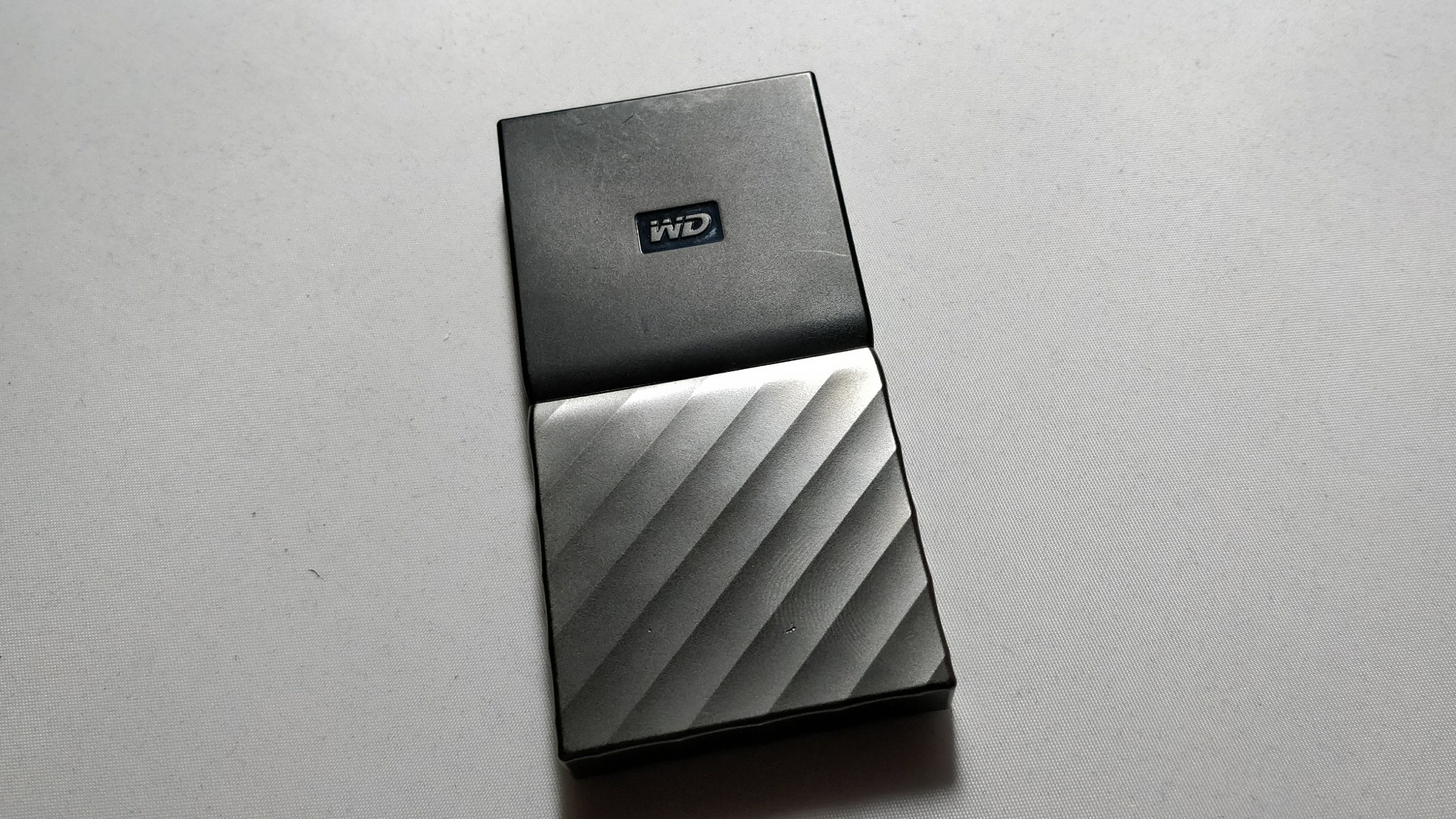WD My Passport SSD review
An impressive basic device that utilises flash to reduce size and increase speed

It’s a safe pair of hands from the coming together of two of the biggest brands in storage - WD and Sandisk - to make what we��re sure is not their finest hour, but the beginnings of a beautiful overlap. A great drive, but it could be even more.
-
+
Consistently fast; Proper USB 3.1 interface; Pleasing form factor
-
-
It’s just not that quick in reality; A little pricey; The WD Discover software nags a lot
Since Western Digital took control of Sandisk in 2014, there has been a constant blurring of the lines between the WD brand, which has traditionally been hard disk (HDD) drives, and Sandisk which was always the king of flash. In fact, a few years ago, the idea of a stalwart range like WD's My Passport having an SSD would have seemed almost an oxymoron.
But times have changed, and WD is now offering a median between the traditional My Passport's 2.5in form factor, and a memory stick, which it is, thus far, leaving to Sandisk.
Smaller and squatter than a standard external USB drive (around half the width and two-thirds the height), the My Passport is designed to be more than just a storage device. As well as offering 256-bit AES encryption, it also claims to be fast enough to run virtual machines.
To do that, it needs the 10Gbits/sec interface speeds of a 'proper' USB-C port and although it's backward compatible, it's only with the right hardware that you'll really see what it can do.
The design is a mixture of gunmetal and plastic, with a rugged build quality (it's designed to be dropped from 1.98m). It doesn't have any give if squeezed, which some devices do, purely because the cases are mostly empty.
As with all WD devices, it comes with a range of proprietary software including backup, security and cloud-syncing packages; in this case, specifically for Dropbox. However, we found that the WD Discover software gave pop-ups even if the drive wasn't plugged in, and runs on startup.
Mac users will be pleased to hear that Time Machine compatibility is an option but as always, that requires reformatting.
Sign up today and you will receive a free copy of our Future Focus 2025 report - the leading guidance on AI, cybersecurity and other IT challenges as per 700+ senior executives
And so to performance, and our test machine came up short of the manufacturer's claims of 515MB/sec, which is to be expected, but what it did throw up remains impressive. Sequential Read/Write speeds of 389.6MB/sec and 384.4MB/sec respectively make for a truly impressive spec sheet.
However, although the random speeds were consistent, they were much lower than we'd have liked to see, maxing out at 38.57MB/sec write and 24.24MBp/sec read for a Q8T8 test and for the all important Q1T1, 18.75MB/sec read and 23.98MB/sec write.
What that tells us is that the WD My Passport SSD is capable of doing almost as much with very little compute power, making its boast of running virtual machines seem very plausible. However, overall it's not the fastest device we've seen for storage. More than adequate, but not by any means phenomenal.
If you're looking to be bowled over, there is better out there. If, on the other hand, you're looking for something that exceeds the performance of an HDD, and is ample for everyday use, there's little not to recommend this, especially if you ignore the sudden outbursts of pop-up messages from the software, of which we are not a fan.
Verdict
It’s a safe pair of hands from the coming together of two of the biggest brands in storage - WD and Sandisk - to make what we’re sure is not their finest hour, but the beginnings of a beautiful overlap. A great drive, but it could be even more.
256GB, 512GB, 1TB
Weight: 73g
Dimensions: 90x45x10mm
Materials: Metal top, plastic base
Interface: USB 3.1 (gen 2/10Gbps/USB C)
Warranty: 3 years
Chris Merriman has been writing about technology since the 1990s for a variety of titles including Computer Shopper, MSN, TechRadar, Tom’s Guide and The Inquirer, where he broke a number of major tech news stories that were picked up globally. He has appeared on BBC, Sky News and Al Jazeera and was the resident tech expert at TalkRadio for a number of years. In between times, he has also been a consultant for several major tech firms.
Chris is fascinated by automation and the internet of things, as well as the evolution of the ways we communicate in the digital era. He's also a frequent contributor to ITPro's software guides, including Windows operating systems. Other specialisms include storage, peripherals, and web apps, and any gadget he’s allowed to take apart and fiddle with, preferably after throwing away the box, manual and receipt.
-
 1,800 MSPs impacted in Pax8 data leak after company shared partner information via email
1,800 MSPs impacted in Pax8 data leak after company shared partner information via emailNews More than a thousand MSPs have been alerted that competitors may now have access to sensitive business data
By Emma Woollacott Published
-
 Workers are wasting half a day each week fixing AI ‘workslop’
Workers are wasting half a day each week fixing AI ‘workslop’News Better staff training and understanding of the technology is needed to cut down on AI workslop
By Emma Woollacott Published
-
 IBM Sovereign Core targets AI and cloud data residency gains for European enterprises
IBM Sovereign Core targets AI and cloud data residency gains for European enterprisesNews The new IBM Sovereign Core service allows organizations to build, manage, and deploy their own AI-ready sovereign workloads
By Emma Woollacott Published